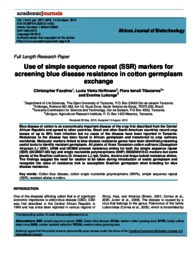Use of simple sequence repeat (SSR) markers for screening blue disease resistance in cotton germoplasm exchange.
Use of simple sequence repeat (SSR) markers for screening blue disease resistance in cotton germoplasm exchange.
Author(s): FAUSTINE, C.; HOFFMANN, L. V.; TIBAZARWA, F. I.; KUKONGE, E.
Summary: Blue disease of cotton is an economically important disease of the crop first described from the Central African Republic and spread to other countries. Brazil and other South American countries record crop losses of up to 80% from infection but no cases of the disease have been reported in Tanzania. Resistance to the disease has been found in African germplasm and transferred to crop cultivars worldwide. Molecular markers linked to blue disease resistance genes have been identified presenting useful tools to identify resistant germplasm. All plants of three Tanzanian cotton cultivars (Gossypium hirsutum L.) UK91, UK08 and UKM08 showed resistance alleles for both the simple sequence repeat (SSR) (DC20027-202 bp) and single nucleotide polymorphisms (SNP) (NG0204310-C) markers but some plants of the Brazilian cultivars (G. hirsutum L.); Ipê, Cedro, Aroeira and Araça lacked resistance alleles. The findings suggest the need for caution to be taken during introduction of exotic germplasm and recognize the value of resistance trait to susceptible Brazilian germplasm when breeding for blue disease resistance.
Publication year: 2015
Types of publication: Journal article
Unit: Embrapa Cotton
Keywords: Algodão, Cotton blue disease, Gene, Germoplasma, Gossypium hirsutum, SSR markers, Safra
Observation
Some of Embrapa's publications are published as ePub files. To read them, use or download one of the following free software options to your computer or mobile device. Android: Google Play Books; IOS: iBooks; Windows and Linux: Calibre.
Access other publications
Access the Agricultural Research Database (BDPA) to consult Embrapa's full library collection and records.
Visit Embrapa Bookstore to purchase books and other publications sold by Embrapa.

